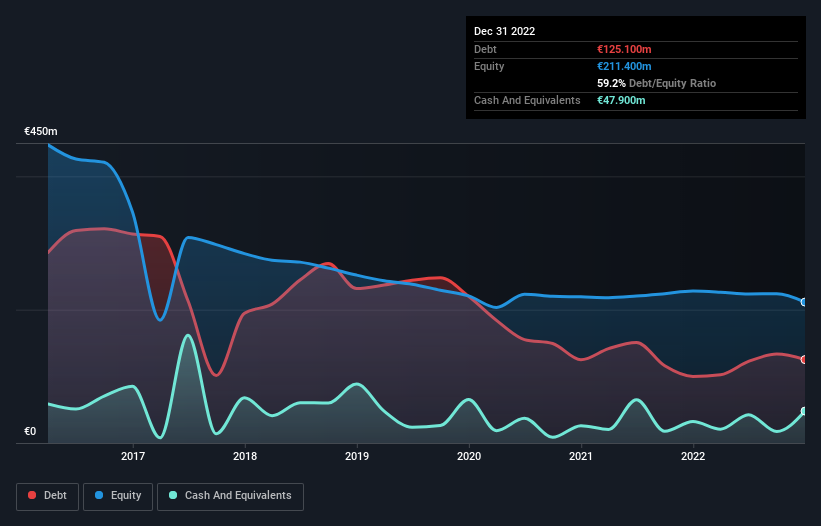
Legendary fund manager Li Lu (who Charlie Munger backed) once said, 'The biggest investment risk is not the volatility of prices, but whether you will suffer a permanent loss of capital.' So it might be obvious that you need to consider debt, when you think about how risky any given stock is, because too much debt can sink a company. As with many other companies Eltel AB (publ) (STO:ELTEL) makes use of debt. But the more important question is: how much risk is that debt creating?
Why Does Debt Bring Risk?
Generally speaking, debt only becomes a real problem when a company can't easily pay it off, either by raising capital or with its own cash flow. Part and parcel of capitalism is the process of 'creative destruction' where failed businesses are mercilessly liquidated by their bankers. However, a more usual (but still expensive) situation is where a company must dilute shareholders at a cheap share price simply to get debt under control. Of course, plenty of companies use debt to fund growth, without any negative consequences. The first step when considering a company's debt levels is to consider its cash and debt together.
Check out our latest analysis for Eltel
What Is Eltel's Debt?
The image below, which you can click on for greater detail, shows that at December 2022 Eltel had debt of €125.1m, up from €99.7m in one year. However, because it has a cash reserve of €47.9m, its net debt is less, at about €77.2m.

How Healthy Is Eltel's Balance Sheet?
Zooming in on the latest balance sheet data, we can see that Eltel had liabilities of €325.2m due within 12 months and liabilities of €85.1m due beyond that. Offsetting this, it had €47.9m in cash and €177.1m in receivables that were due within 12 months. So its liabilities outweigh the sum of its cash and (near-term) receivables by €185.3m.
Given this deficit is actually higher than the company's market capitalization of €150.0m, we think shareholders really should watch Eltel's debt levels, like a parent watching their child ride a bike for the first time. In the scenario where the company had to clean up its balance sheet quickly, it seems likely shareholders would suffer extensive dilution. The balance sheet is clearly the area to focus on when you are analysing debt. But it is future earnings, more than anything, that will determine Eltel's ability to maintain a healthy balance sheet going forward. So if you're focused on the future you can check out this free report showing analyst profit forecasts.
Over 12 months, Eltel saw its revenue hold pretty steady, and it did not report positive earnings before interest and tax. While that hardly impresses, its not too bad either.
Caveat Emptor
Over the last twelve months Eltel produced an earnings before interest and tax (EBIT) loss. To be specific the EBIT loss came in at €2.0m. Considering that alongside the liabilities mentioned above make us nervous about the company. We'd want to see some strong near-term improvements before getting too interested in the stock. It's fair to say the loss of €15m didn't encourage us either; we'd like to see a profit. And until that time we think this is a risky stock. The balance sheet is clearly the area to focus on when you are analysing debt. However, not all investment risk resides within the balance sheet - far from it. Case in point: We've spotted 1 warning sign for Eltel you should be aware of.
Of course, if you're the type of investor who prefers buying stocks without the burden of debt, then don't hesitate to discover our exclusive list of net cash growth stocks, today.
Valuation is complex, but we're here to simplify it.
Discover if Eltel might be undervalued or overvalued with our detailed analysis, featuring fair value estimates, potential risks, dividends, insider trades, and its financial condition.
Access Free AnalysisHave feedback on this article? Concerned about the content? Get in touch with us directly. Alternatively, email editorial-team (at) simplywallst.com.
This article by Simply Wall St is general in nature. We provide commentary based on historical data and analyst forecasts only using an unbiased methodology and our articles are not intended to be financial advice. It does not constitute a recommendation to buy or sell any stock, and does not take account of your objectives, or your financial situation. We aim to bring you long-term focused analysis driven by fundamental data. Note that our analysis may not factor in the latest price-sensitive company announcements or qualitative material. Simply Wall St has no position in any stocks mentioned.
About OM:ELTEL
Eltel
Operates as an infrastructure and service provider for critical communication and power networks in Finland, Sweden, Norway, Denmark, Lithuania, Germany, and internationally.
Undervalued with excellent balance sheet.
Similar Companies
Market Insights
Community Narratives




